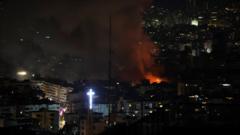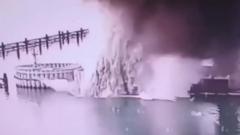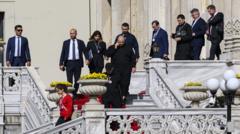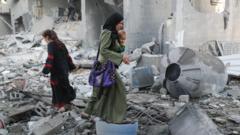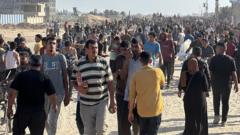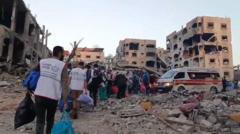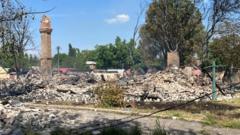As Russian authorities tighten their grip on occupied Ukraine, locals endure severe restrictions on language, culture, and identity while forming underground resistance movements to fight back.
Resistance Amidst Repression: Life Inside Russian-Occupied Ukraine
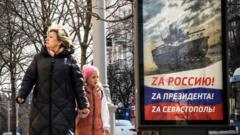
Resistance Amidst Repression: Life Inside Russian-Occupied Ukraine
Ukrainians living under Russian occupation reveal the harsh realities of daily life, repression, and their struggle for identity.
In occupied Ukraine, the resilience and voices of locals like Maria, who belong to underground resistance groups, reveal a stark contrast to the oppressive regime imposed by Russian authorities. The Kremlin has launched an intensive campaign to erase Ukrainian identity, banning the use of the Ukrainian language and traditional celebrations, often inflicting severe consequences on dissenters.
Under these brutal conditions, many Ukrainians live in fear of speaking out, as illustrated by representatives from occupied regions like Mariupol and Zaporizhzhia, where residents are afraid to communicate with journalists or even family members due to the risk of repercussions from Russian security services. The forced adoption of Russian citizenship has left many without basic services, compounding their struggles.
Despite the atmosphere of surveillance and repression—characterized by extensive use of CCTV and punitive laws against those expressing dissent—some brave residents manage to organize non-violent resistance movements, such as Zla Mavka, which promotes peaceful defiance through the distribution of informational materials. They operate against a backdrop of increasing propaganda and hostility from Russian external influence, further complicating their fight for identity and autonomy.
Reports indicate that more than 121 activists have met grim fates since the beginning of Russia's full-scale invasion in 2022, while propaganda pervades public spaces, schools, and media, reinforcing pro-Russian sentiment and vilifying Ukrainian sovereignty. The challenge remains daunting, but the spirit of resistance continues in occupied territories, as individuals risk their safety to assert their cultural identity and strive for Ukraine’s future.
Under these brutal conditions, many Ukrainians live in fear of speaking out, as illustrated by representatives from occupied regions like Mariupol and Zaporizhzhia, where residents are afraid to communicate with journalists or even family members due to the risk of repercussions from Russian security services. The forced adoption of Russian citizenship has left many without basic services, compounding their struggles.
Despite the atmosphere of surveillance and repression—characterized by extensive use of CCTV and punitive laws against those expressing dissent—some brave residents manage to organize non-violent resistance movements, such as Zla Mavka, which promotes peaceful defiance through the distribution of informational materials. They operate against a backdrop of increasing propaganda and hostility from Russian external influence, further complicating their fight for identity and autonomy.
Reports indicate that more than 121 activists have met grim fates since the beginning of Russia's full-scale invasion in 2022, while propaganda pervades public spaces, schools, and media, reinforcing pro-Russian sentiment and vilifying Ukrainian sovereignty. The challenge remains daunting, but the spirit of resistance continues in occupied territories, as individuals risk their safety to assert their cultural identity and strive for Ukraine’s future.




